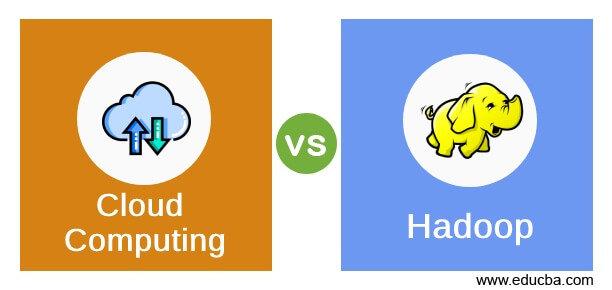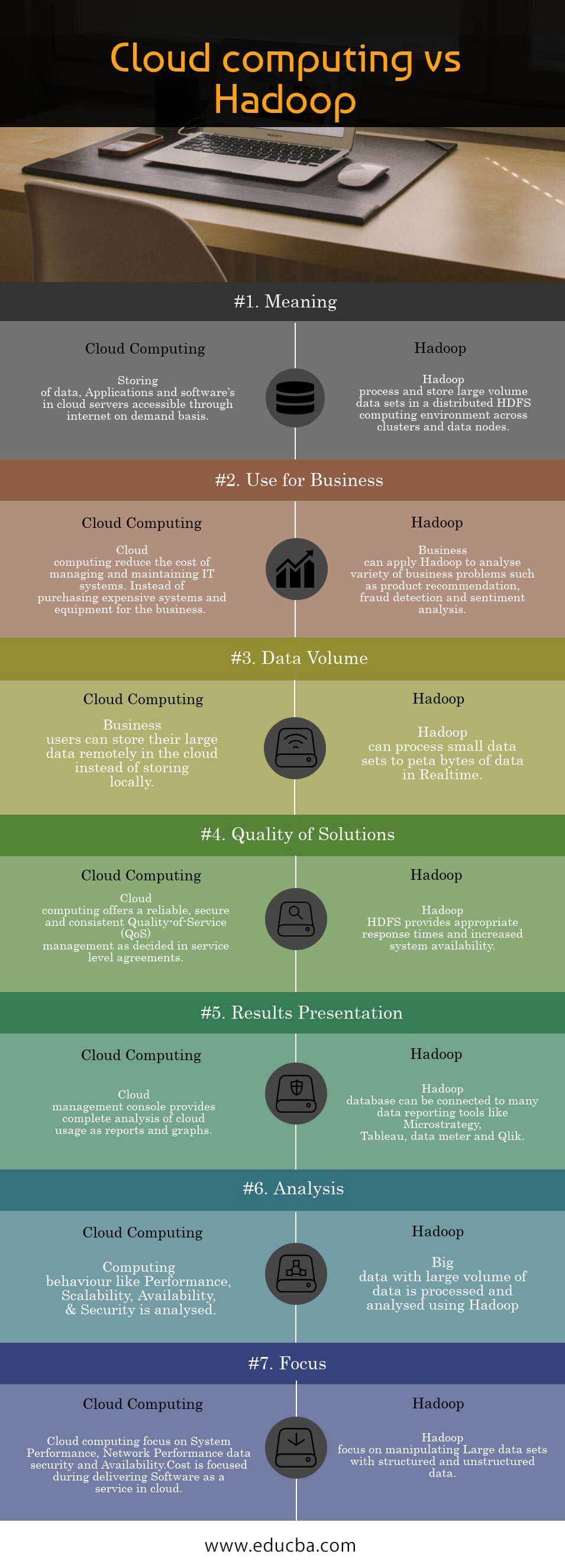Updated July 5, 2023

Difference Between Cloud Computing vs Hadoop
Cloud Computing: In recent days, cloud computing means storing and accessing data, programs, applications, and files over the Internet of the premises rather than on-premises installed on a hard drive. Cloud computing delivers on-demand computing services using the communication network on a pay-as-used basis, including applications or complete data centers on the centralized server, accessible from anywhere remotely in the world using the Internet. Cloud computing has different types of service offerings like Infrastructure-as-a-service (IaaS), Platform-as-a-service (PaaS), and Software-as-a-service (SaaS). Cloud computing eliminated worries about companies installing software and services in their company environment which is highly expensive.
Top cloud computing public, private, mobile, and hybrid service provider companies:
- Amazon Web Services
- Microsoft Azure
- Google Cloud Platform
- Adobe
- VMware
- IBM Cloud
- Rackspace
- Red Hat
- Salesforce
- Oracle Cloud
- SAP
- Verizon Cloud
- Navisite
- Dropbox
- Egnyte
Hadoop: Hadoop is developed by Apache Software Foundation as an open-source ecosystem using a Java-based programming framework to support, process, and store large volume data sets in a distributed HDFS computing file system-based environment. Hadoop supports considerable data manipulation by storing and analyzing structured and unstructured data across clusters and data nodes from different computers using simple programming models related to SQL programming.
Hadoop is cable of dealing data with huge volumes, different varieties, high velocity, and veracity with enormous processing power. Hadoop is not a library to process large datasets but has a collection of libraries for data and related data science technologies. The use of Hadoop has increased significantly over the past 10 years with the evolution of big data. Social media generates PETA bites of data daily, which can be used for predictive analytics, data mining, and machine learning applications.
Apache organization describes some of the components of the Hadoop ecosystem:
Head-to-Head Comparison Between Cloud Computing vs Hadoop (Infographics)
Below are the top 7 comparisons between Cloud Computing vs Hadoop:

Key Differences Between Cloud Computing vs Hadoop
Below are the lists of points that describe the key differences between Cloud Computing vs Hadoop:
- In cloud computing, users install software and applications, making them accessible online. Hadoop is a Java-based framework used to manipulate data in the cloud or on-premises. Users can install Hadoop on cloud servers to manage big data, but the cloud alone cannot manage data without Hadoop.
- Hadoop packages consist of distributed database system function inside a file system that supports unstructured data and stores a large amount of data with high processing rates depending on processor speed. Cloud computing provides distributed computing services that make IT infrastructures accessible based on network speed.
- The Apache Foundation created Hadoop as an open-source software project to manipulate data, and cloud computing is an on-demand service that manages data and its supporting applications.
- Users can add various components to Hadoop to handle big data, but all the details and applications supporting the Hadoop ecosystem are managed within the cloud computing model.
- Hadoop is a designed Java framework that can be installed in cloud data centers or locally, but Cloud computing is developed like a computer on a cloud where all Hadoop and Java are installed.
- Accessing applications in Cloud computing is fast with a high-speed private network, but data movement speed in Hadoop depends on CPU and Hadoop installed system processor speed.
- Cloud computing services offer data back services for the application’s metadata and Real-time data. If users install Hadoop in the cloud, cloud computing services will manage the master data backup as part of customer service. The user will have to pay for security purposes.
- Implementing Cloud computing services is easy because there is no need for much installation knowledge. Cloud service providers have highly skilled labor to maintain and provide support with services with a low budget so that ROI will be more for the organizations.
Whereas to use Hadoop or to install Hadoop installed in cloud computing or in-home premises, Hadoop and Big data skills are mandatory, and Hadoop data science services provide Business insights, Analysis data, etc., which will return more income to the organization. - In cloud computing, different users can use other applications or cloud services at some point in time at any given rate of time via the Internet remotely. Similarly, Hadoop has a multitasking feature capable of parallel processing large datasets using parallel data processing.
- Cloud computing security features will provide a disaster backup facility where cloud computing servers are remotely managed with high security and protection same features implies in Hadoop, which has a fault-tolerant feature where data is processed in one node. Another node in the cluster replicates the data. So, when a failure occurs in one node copy of data is available in another node.
Comparison Table Between Cloud Computing vs Hadoop
Below are the lists of points that describe the differences between Cloud Computing vs Hadoop:
| Basis For Comparison | Cloud Computing | Hadoop |
| Meaning | Cloud servers store data, applications, and software, which can be accessed online on demand. | Hadoop processes and stores large-volume data sets in a distributed HDFS computing environment across clusters and data nodes. |
| Use for Business | Cloud computing reduces the cost of managing and maintaining IT systems instead of purchasing expensive systems and equipment for the business. | Businesses can apply Hadoop to analyze various business problems, such as product recommendation, fraud detection, and sentiment analysis. |
| Data Volume | Business users can store their extensive data remotely in the cloud instead of locally. | Hadoop can process small data sets to petabytes of data in real-time. |
| Quality of Solutions | Cloud computing offers reliable, secure, and consistent Quality-of-Service (QoS) management as decided in service level agreements. | Hadoop HDFS provides appropriate response times and increased system availability. |
| Results Presentation | The cloud management console provides a complete analysis of cloud usage as reports and graphs. | Hadoop database can be connected to many data reporting tools like Microstrategy, Tableau, data meter, and Qlik. |
| Analysis | Computing behavior like Performance, Scalability, Availability, & Security is analyzed. | Hadoop processes and analyzes big data with large volumes of data. |
| Focus | Cloud computing focus on System Performance, Network Performance, data security, and Availability. We focus on delivering software as a service in the cloud, primarily focusing on cost. | Hadoop focuses on manipulating Large data sets with structured and unstructured data. |
Conclusion
After brief research to know the difference between Cloud computing and Hadoop or is Hadoop different from Cloud computing? I concluded that both Cloud computing and Hadoop are interdependent in simpler terms, where Cloud computing is like a box with Dollars, and Hadoop is like each dollar in the box. Cloud computing is a storage drive with different operating systems, applications, frameworks, and Software development kits installed and maintained in a cloud platform available through the Internet, which can be accessed remotely on-demand basis according to organization requirements.
The Apache Foundation developed Hadoop as a software product using the Java framework to handle data. It can be installed on any cloud deployment service like AWS, Microsoft, or Google. Hadoop cannot provide middle where services for managing applications, storage, and software. But Cloud computing contains Hadoop and its related components like source systems, target databases, runtime environments, etc. Cloud computing resembles a computer with various software installed and maintained virtually. You can install Hadoop, a software package, on a computer or keep it virtually on a cloud.
Recommended Articles
This has been a guide to Cloud Computing vs Hadoop. Here we have discussed Cloud Computing vs Hadoop head-to-head comparisons, key differences, infographics, and comparison table. You may also look at the following articles to learn more –

